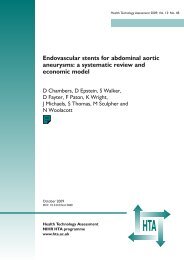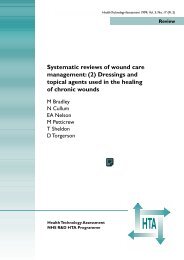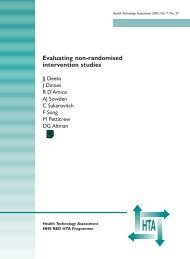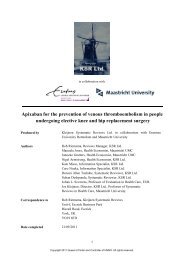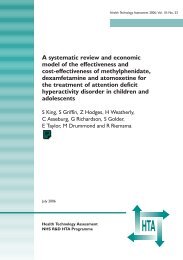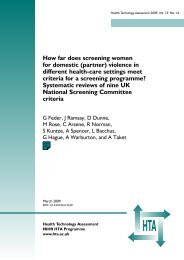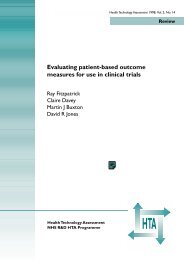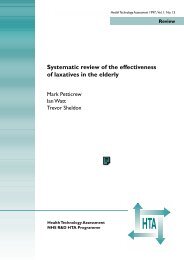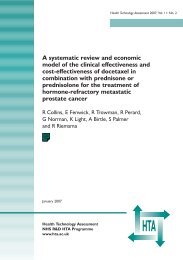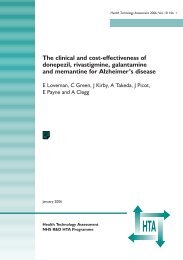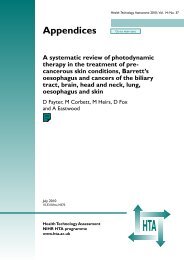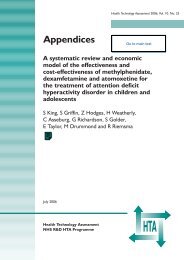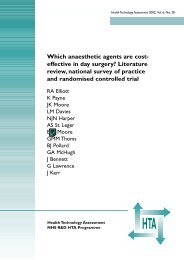Rivaroxaban for the treatment of deep vein thrombosis and ...
Rivaroxaban for the treatment of deep vein thrombosis and ...
Rivaroxaban for the treatment of deep vein thrombosis and ...
Create successful ePaper yourself
Turn your PDF publications into a flip-book with our unique Google optimized e-Paper software.
The ERG are <strong>of</strong> <strong>the</strong> underst<strong>and</strong>ing that antiocoagulation is used long term in approximately 20% <strong>of</strong><br />
patients with a DVT. The EINSTEIN-DVT trial provided no data on longer term <strong>treatment</strong> with<br />
rivaroxaban, <strong>and</strong> data from <strong>the</strong> EINSTEIN-Ext provided data versus placebo, ra<strong>the</strong>r than an active<br />
<strong>treatment</strong> in a poorly defined population <strong>of</strong> patients. This trial showed that rivaroxaban is effective at<br />
decreasing recurrence <strong>of</strong> VTE in patients with an index DVT, but with some increase in clinically<br />
relevant non-major bleeding rates, <strong>and</strong> a non-significant increase in major bleeding. The effects <strong>of</strong><br />
long term <strong>treatment</strong> with rivaroxaban in comparison with long term <strong>treatment</strong> with LMWH/VKA,<br />
whe<strong>the</strong>r this be in patients indicated <strong>for</strong> long term <strong>treatment</strong> or those in an equivocal state, is<br />
unknown.<br />
In conclusion, <strong>the</strong> decision problem has been fairly well addressed by <strong>the</strong> evidence provided. Gaps in<br />
<strong>the</strong> population include those at high risk <strong>of</strong> bleeding, those with a non-proximal DVT <strong>and</strong> those with<br />
renal impairment. There is no in<strong>for</strong>mation relating to how rivaroxaban compares to <strong>treatment</strong> with<br />
unfractionated heparin <strong>and</strong> LMWH in patients who would normally be treated with <strong>the</strong>se. The data<br />
relating to <strong>the</strong> cancer subgroup <strong>of</strong> patients is not considered robust by <strong>the</strong> ERG. The ERG also has<br />
concerns about <strong>the</strong> efficacy <strong>of</strong> rivaroxaban in patients who fall into <strong>the</strong> 3 month intended <strong>treatment</strong><br />
duration, <strong>and</strong> <strong>the</strong>re is no evidence relating to long term <strong>treatment</strong> with rivaroxaban compared to o<strong>the</strong>r<br />
active <strong>treatment</strong>s. However, <strong>for</strong> patients in a poorly defined class <strong>of</strong> “clinical equipoise”, ongoing<br />
<strong>treatment</strong> appears better than no preventative <strong>the</strong>rapy, <strong>and</strong> in <strong>the</strong> majority <strong>of</strong> patients treated <strong>for</strong> one<br />
year or less <strong>for</strong> proximal DVT in Engl<strong>and</strong> <strong>and</strong> Wales, rivaroxaban appears to be non-inferior to<br />
<strong>treatment</strong> with Enoxaparin/VKA.<br />
84<br />
Copyright 2012 Queen's Printer <strong>and</strong> Controller <strong>of</strong> HMSO. All rights reserved.



